In the ever-evolving field of nanomedicine, lipid nanoparticles (LNPs) have emerged as a powerful tool for targeted drug delivery. These tiny particles, typically measuring between 10-100 nanometers in diameter, are composed of lipids (fatty molecules) and have the ability to encapsulate both hydrophilic and lipophilic drugs. LNPs have shown immense promise in overcoming the limitations of traditional drug delivery methods, offering improved efficacy, reduced toxicity, and enhanced patient comfort.
Targeted Delivery for Enhanced Efficacy
One of the primary advantages of LNPs is their ability to selectively target diseased tissues while minimizing uptake in healthy cells. This is achieved through a process called passive targeting, where the nanoparticles accumulate in areas with increased vascular permeability, such as cancerous tumors. Additionally, LNPs can be engineered for active targeting by conjugating the surface with specific ligands that bind to receptors overexpressed on diseased cells. This dual-targeting approach enables a more precise delivery of therapeutic agents directly to the site of action.
Improved Bioavailability for Sustained Action
LNPs have also been shown to enhance the bioavailability of encapsulated drugs. The lipid matrix provides protection against enzymatic degradation and rapid clearance, allowing for sustained release of the drug over an extended period. This can lead to improved pharmacokinetics and pharmacodynamics, potentially reducing the required dosage and frequency of administration. Furthermore, the biocompatible and biodegradable nature of lipids minimizes the risk of adverse reactions and accumulation in the body.
Optimizing Design for Enhanced Performance
Recent research has focused on optimizing the composition and design of LNPs to further enhance their performance. Investigators have explored various types of lipids, including cholesterol, phospholipids, and triglycerides, each offering unique properties that can influence the nanoparticles’ behavior in vivo. The incorporation of charged lipids, such as cationic lipids, has been shown to improve cellular uptake and endosomal escape, ensuring the delivered drug reaches its intended intracellular target.
Delivering the Promise of Novel Therapeutics
Scientists have also been investigating the use of LNPs for the delivery of novel therapeutic modalities, such as RNA-based drugs and CRISPR-Cas9 gene editing tools. The ability of LNPs to protect these sensitive molecules from degradation and facilitate their uptake into cells has opened up new avenues for the treatment of previously undruggable diseases. Recent clinical trials have demonstrated the safety and efficacy of LNP-formulated RNA interference therapies, with several products already approved for the treatment of genetic disorders.
Overcoming Challenges for Widespread Adoption
Despite the significant progress made with LNPs, challenges remain to be addressed. The scalability and reproducibility of the manufacturing process are critical factors that need to be optimized to ensure consistent quality and batch-to-batch reproducibility. Additionally, a deeper understanding of the nanoparticles’ interactions with the biological environment is required to predict their behavior in vivo and minimize potential toxicity.
A Transformative Approach to Medicine
In conclusion, lipid nanoparticles represent a transformative approach to drug delivery, offering the potential to revolutionize the treatment of a wide range of diseases. As researchers continue to refine their design and overcome the existing challenges, LNPs are poised to play an increasingly prominent role in the future of medicine. With their ability to selectively target diseased tissues and enhance the delivery of potent therapeutic agents, these tiny particles hold immense promise in improving patient outcomes and transforming lives.

